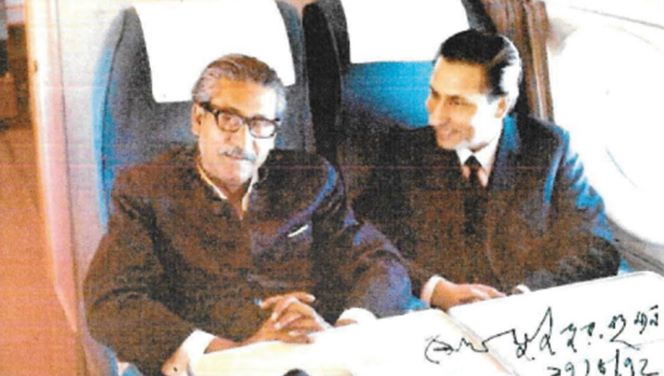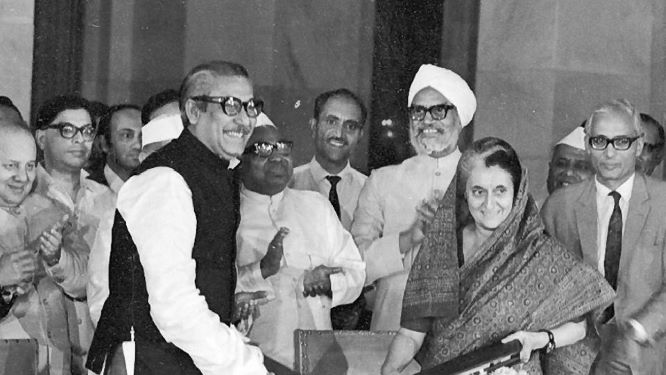By Sugeeswara Senadhira/Ceylon Today
Colombo, March 22: When the news spread in January 1972 that Sheikh Mujibur Rehman, who was released from the Pakistani prison would arrive in New Delhi on his way to the newly-born Bangladesh to assume leadership, I was among the large number of politically-conscience students and others who thronged the Ramlila Maidan in Delhi to listen to the newest leader in South Asia who earned the sobriquet Bongo Bondhu (Banga Bandhu).
Though five decades have passed, I still remember vividly the enthusiasm among the crowd which hailed Mujib, who accompanied Prime Minister Indira Gandhi to the dais, erected at the Delhi Gate end of the Ramlila Maidan, the popular venue of annual celebrations of Dhashera, which marks the victory of good over evil.
The rally at Ramlila Maidan on the winter morning of 10 January 1972 was an unforgettable experience. A motor rally went to the meeting place from the airport. Prime Minister Indira Gandhi was with Banga Bandhu.
Welcoming the new leader, Indira Gandhi gave a brief speech in Hindi. Sheikh Mujib started his speech in Bengali, the common language of West Bengal in India and Bangladesh, hitherto East Pakistan. The moment he started his speech with the words, “Missus Indira Gandhi, ladies and gentlemen…” a deafening applaud started. We all cheered his every sentence in musical Bengali, with intermittent sentences in English, Hindi and Urdu.
The Pakistani military government released Mujibur Rehman from Mianwali Prison located near the Pakistan Army’s GHQ in Rawalpindi in the then West Pakistan and put him on a London-bound PIA flight on 8 January 1972. Indian Prime Minister Indira Gandhi requested the British Premier Edward Heath to arrange a special British flight for him to fly to Delhi, and Sashanka S. Banerjee, the Indian diplomat who accompanied Sheikh Mujibur Rahman on the special Royal Air Force aircraft from London to New Delhi, recalled that a revolutionary leader sang the famous Bengali song written by Poet Rabindranath Tagore during the flight.
National anthem
“After about an hour of small talk, ‘Bongo Bondhu’ stood up and started singing ‘Aamar Shonaar Bangla, Aami Tomaye Bhalobashi’ (Oh my golden Bengal, I love you dearly’), Banerjee, also a Bengali, said and added, “I was seated next to him, and as he started singing, I too stood up as he did. Mujibur Rahman asked me to join him in singing the song with him, which I did. I don’t have a good singer’s voice but I tried.” After completing the song, Mujib told Banerjee that he would choose Aamar Shonaar Bangla as the ‘Jaatiyo shongeet’(national anthem) of his new nation, Bangladesh.
During the last two days (20 and 21 March), Prime Minister Mahinda Rajapaksa was among the dignitaries who attended the celebration of the birth centenary of Bangladesh’s Father of the Nation, Banga Bandhu Sheikh Mujibur Rahman and the Golden Jubilee of the Independence of Bangladesh in Dhaka.
In the 1971 Pakistan General Elections, Sheikh Mujibur Rehman’s Awami League won more seats than the Zulfikhar Ai Bhutto’s People’s Party, but Mujib was arrested and Bhutto was made the Prime Minister as the powerful military did not want an East Pakistani Bengali as leader preferring West Pakistan’s Bhutto.

When Mujib was taken to West Pakistan and detained in the Mianwali Prison in Rawalpindi, riots broke out in East Pakistan. Mujib’s Awami League activists finally took up arms against the military. The situation took a serious turn when a large number of Bengalis in the Pakistan Army deserted and joined the Mukthi Bahini rebels. More than a million Bengali civilians crossed the border to India’s West Bengal and Bihar as refugees. Finally Indian troops entered East Pakistan to support the Mukthi Bahini fighters in December 1971.
Within two weeks, 96,000 Pakistani soldiers surrendered to Indian forces, ending the war and former East Pakistan became a free nation. After the Ramilila Maidan rally, Mujib flew to Dhaka and became the undisputed leader of the new country.
Free Bangladesh had a troubled beginning. In 1975, Mujib was killed in a military coup. After an interim period, Gen Zia-ur-Rahman, who was the Commander of Mukthi Bahini during the liberation fight, became President in 1977. He was assassinated in 1981. Since then the country saw military rule and violent elections, restoration of democracy and alternate power shifts between two women leaders, Sheikh Hasina, Mujib’s daughter, and Khaleda Zia, wife of former President General Zia ur Rahman.
The dream
Indian diplomat Banerjee later revealed that he had told Mujib that PM Indira Gandhi had a dream that on India’s eastern flank she wished to have a friendly power, a prosperous economy, and a secular democracy, with a parliamentary system of government like India’s. That dream has been realized with Bangladesh functioning as a strong democracy today.
During his visit Prime Minister Rajapaksa visited the National Martyrs’ Memorial and placed a wreath to pay his respects to those who died in the Bangladesh War of Independence and plant a sapling. Later, the Prime Minister visited the Banga Bandhu Memorial Museum.
After the end of war, Prime Minister Indira Gandhi promoted Army Commander General Sam Manekshaw to the rank of Field Marshal. When the Indian Parliament met after the war victory, Indira Gandhi got a very pleasant surprise when her political archenemy, Jan Sangh (now BJP) leader Atal Behari Vajpayee, who was the Opposition Leader in Lok Sabha, got up from his seat and proposed that Prime Minister Indira Gandhi be accorded the Bharat Ratna, the highest honor in India. Vajpayee’s statesmanship was a grand gesture worth emulating as it depicted that patriotism was above petty political differences.
END





























































